浅谈英语全球化原因
- 格式:doc
- 大小:24.00 KB
- 文档页数:4

英语发展现状及未来趋势分析浅析英语作为一种全球通用语言,在世界范围内发挥着重要的作用。
然而,随着时间的推移和全球化的发展,英语的发展现状和未来趋势也在不断变化。
本文将对英语的发展现状进行分析,并展望未来的趋势。
首先,英语在全球范围内的地位仍然相当稳固。
尽管在一些国家,本地语言的地位仍然较为重要,但英语作为全球商务和科技交流的主要语言,仍然占据着重要的地位。
世界上许多大型多国企业都是以英语作为沟通语言,这促使人们学习和使用英语的需求仍然很高。
其次,英语作为全球通用语言的地位也面临一些挑战。
随着中国和印度等国崛起为经济强国,他们本土语言的重要性也有所提高。
此外,一些非英语母语国家也开始推动本地语言的使用和发达。
这种趋势可能对英语的全球地位产生一定的影响。
其次,英语的发展也在不断适应新的需求和技术变革。
随着互联网的普及和全球化的加速发展,人们越来越需要借助英语进行跨文化交流和知识获取。
因此,英语学习者可以通过在线学习平台和应用程序,以便捷和有效的方式学习英语。
未来,英语的发展趋势将在以下几个方面展开。
首先,英语将越来越多地被视为一种基本的语言技能,而不仅仅是学术或商务需求。
在全球化的背景下,掌握英语将成为更多人追求的目标,不仅仅是为了求职和提升竞争力,也是为了增加个人的全球意识和文化交流能力。
其次,随着技术的不断革新,语言学习也将呈现出新的趋势。
人工智能和机器翻译的不断发展,将使英语学习更加便捷和个性化。
学习者可以利用智能手机应用程序、在线课程和虚拟现实等新技术,提高英语学习的效果。
此外,英语的发展趋势还将受到全球教育政策和经济条件的影响。
一些国家可能会在教育体系中加强英语教育的地位,同时提供更多的机会和资源。
然而,对于一些发展中国家来说,面临的挑战可能更大,因为他们可能缺乏相关的资源和资金。
总的来说,英语作为全球通用语言的地位仍然相当重要,但也面临着一些挑战。
随着全球化的进一步发展和技术的不断创新,我们可以预见,英语将越来越多地被看作一种基本的语言技能,并随着技术的进步而发展和调整。
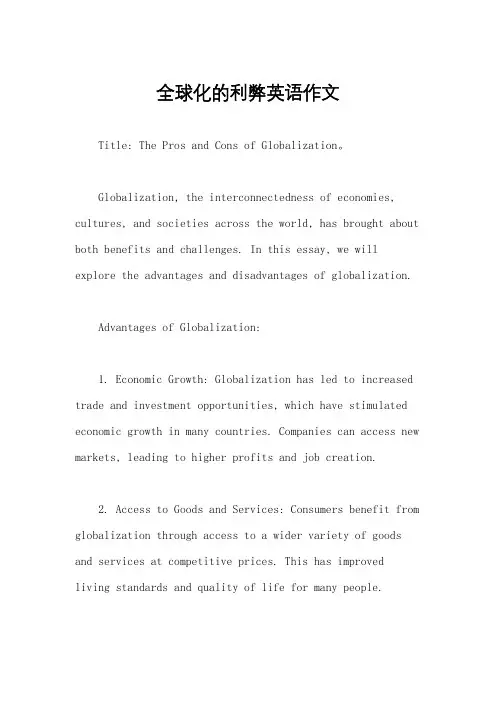
全球化的利弊英语作文Title: The Pros and Cons of Globalization。
Globalization, the interconnectedness of economies, cultures, and societies across the world, has brought about both benefits and challenges. In this essay, we will explore the advantages and disadvantages of globalization.Advantages of Globalization:1. Economic Growth: Globalization has led to increased trade and investment opportunities, which have stimulated economic growth in many countries. Companies can access new markets, leading to higher profits and job creation.2. Access to Goods and Services: Consumers benefit from globalization through access to a wider variety of goods and services at competitive prices. This has improvedliving standards and quality of life for many people.3. Cultural Exchange: Globalization facilitates the exchange of ideas, values, and cultural practices among nations. This cultural diversity enriches societies and promotes understanding and tolerance among people from different backgrounds.4. Technological Advancement: Globalization has spurred innovation and technological advancement by encouraging collaboration and knowledge sharing across borders. This has resulted in improvements in various fields, including healthcare, communication, and transportation.5. Global Cooperation: Global challenges such as climate change, terrorism, and pandemics require international cooperation. Globalization has fostered closer ties between nations, enabling them to work together to address common issues.Disadvantages of Globalization:1. Growing Economic Inequality: While globalization has led to overall economic growth, it has also widened the gapbetween the rich and the poor within and between countries. Some regions and social groups have been left behind, exacerbating poverty and inequality.2. Cultural Homogenization: The spread of global media and consumer culture has led to the erosion of localcultures and traditions. This cultural homogenization can result in the loss of cultural diversity and identity.3. Environmental Degradation: The pursuit of economic growth in a globalized world has often come at the expenseof the environment. Industrialization, deforestation, and pollution have led to environmental degradation and climate change, threatening the planet's sustainability.4. Exploitation of Workers: Globalization has led tothe outsourcing of jobs to countries with lower labor costs, where workers may be exploited and subjected to poorworking conditions. This has raised concerns about labor rights and social justice.5. Vulnerability to Economic Shocks: Interconnectedglobal markets can magnify the impact of economic crises and financial instability. A downturn in one part of the world can quickly spread to others, leading to widespread economic turmoil and hardship.In conclusion, while globalization has brought about significant benefits in terms of economic growth, cultural exchange, and technological advancement, it also poses challenges such as economic inequality, cultural homogenization, environmental degradation, exploitation of workers, and vulnerability to economic shocks. It is essential for policymakers to address these challenges while harnessing the opportunities presented by globalization to create a more inclusive, sustainable, and prosperous world for all.。
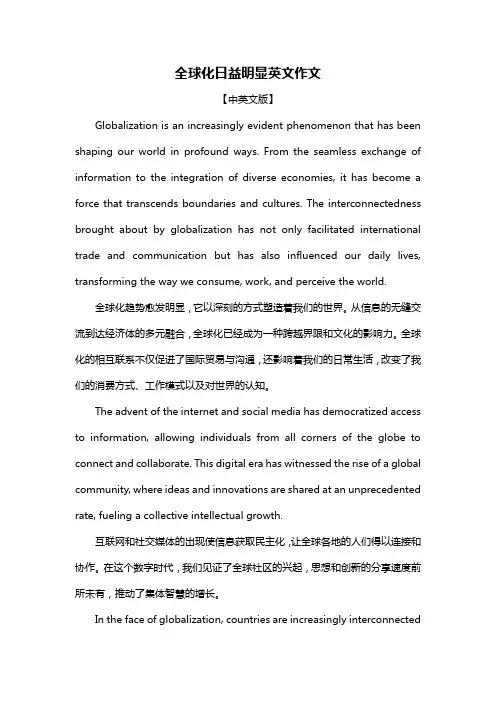
全球化日益明显英文作文【中英文版】Globalization is an increasingly evident phenomenon that has been shaping our world in profound ways. From the seamless exchange of information to the integration of diverse economies, it has become a force that transcends boundaries and cultures. The interconnectedness brought about by globalization has not only facilitated international trade and communication but has also influenced our daily lives, transforming the way we consume, work, and perceive the world.全球化趋势愈发明显,它以深刻的方式塑造着我们的世界。
从信息的无缝交流到达经济体的多元融合,全球化已经成为一种跨越界限和文化的影响力。
全球化的相互联系不仅促进了国际贸易与沟通,还影响着我们的日常生活,改变了我们的消费方式、工作模式以及对世界的认知。
The advent of the internet and social media has democratized access to information, allowing individuals from all corners of the globe to connect and collaborate. This digital era has witnessed the rise of a global community, where ideas and innovations are shared at an unprecedented rate, fueling a collective intellectual growth.互联网和社交媒体的出现使信息获取民主化,让全球各地的人们得以连接和协作。
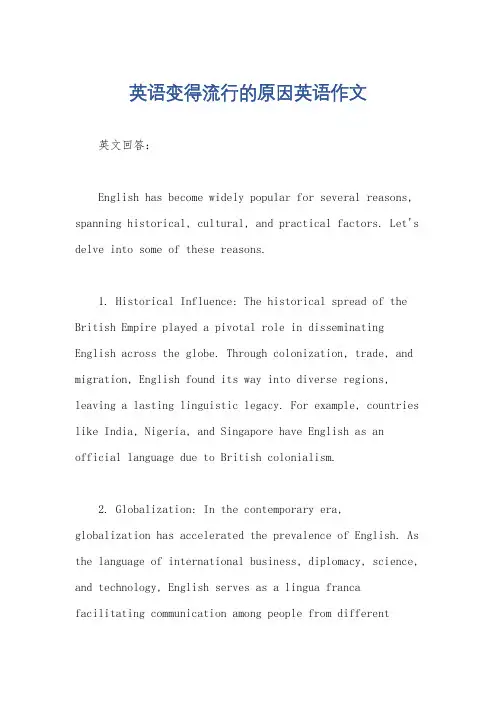
英语变得流行的原因英语作文英文回答:English has become widely popular for several reasons, spanning historical, cultural, and practical factors. Let's delve into some of these reasons.1. Historical Influence: The historical spread of the British Empire played a pivotal role in disseminating English across the globe. Through colonization, trade, and migration, English found its way into diverse regions, leaving a lasting linguistic legacy. For example, countries like India, Nigeria, and Singapore have English as an official language due to British colonialism.2. Globalization: In the contemporary era,globalization has accelerated the prevalence of English. As the language of international business, diplomacy, science, and technology, English serves as a lingua franca facilitating communication among people from differentlinguistic backgrounds. For instance, multinational corporations often adopt English as their official language to streamline operations and foster cohesion among employees from various countries.3. Cultural Dominance: The influence of English-speaking countries in media, entertainment, and popular culture has further propelled the popularity of the language. Hollywood movies, British literature, and American music permeate global markets, exposing people to English language and expressions from an early age. As a result, many individuals aspire to learn English to engage with these cultural products and participate in global conversations.4. Educational Prestige: English is often associatedwith educational and economic opportunities. Proficiency in English can enhance career prospects, academic achievements, and social mobility. Countries where English is not the native language invest heavily in English languageeducation to equip their citizens with essential skills for success in the global arena. Moreover, prestigiousuniversities and research institutions predominantly use English as the medium of instruction and publication, attracting scholars and students worldwide.5. Technological Advancements: The digital age has facilitated the dissemination of English through the internet, social media, and digital communication platforms. English-language content dominates cyberspace, shapingonline interactions and information dissemination. From social networking sites to online learning platforms, English serves as the primary mode of communication, encouraging individuals to acquire English proficiency to navigate the digital landscape effectively.Overall, the popularity of English can be attributed to a combination of historical legacies, globalization,cultural influence, educational incentives, andtechnological advancements, making it a ubiquitous and indispensable language in today's interconnected world.中文回答:英语之所以变得流行有几个原因,涉及历史、文化和实用等方面的因素。
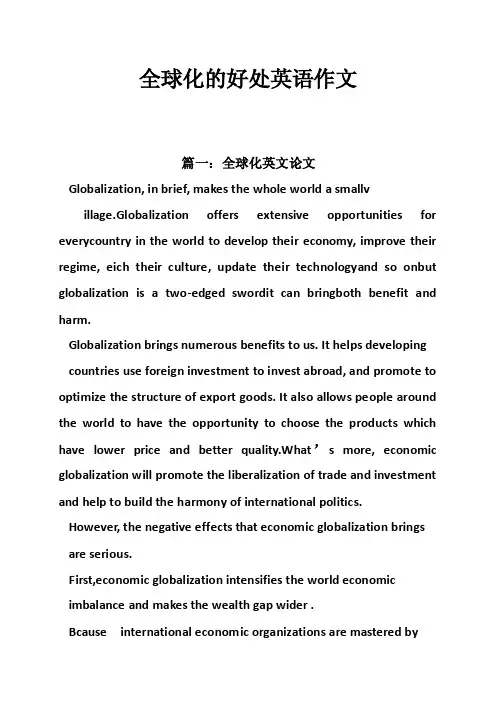
全球化的好处英语作文篇一:全球化英文论文Globalization, in brief, makes the whole world a smallv illage.Globalization offers extensive opportunities for everycountry in the world to develop their economy, improve their regime, eich their culture, update their technologyand so onbut globalization is a two-edged swordit can bringboth benefit and harm.Globalization brings numerous benefits to us. It helps developing countries use foreign investment to invest abroad, and promote to optimize the structure of export goods. It also allows people around the world to have the opportunity to choose the products which have lower price and better quality.What’s more, economic globalization will promote the liberalization of trade and investment and help to build the harmony of international politics.However, the negative effects that economic globalization brings are serious.First,economic globalization intensifies the world economicimbalance and makes the wealth gap wider .Bcause international economic organizations are mastered bydeveloped countries, and they enact various principles, systems and orders for economy running. As a result, economic globalization is much more to the benefit of highly developed countries than in developing countries!Second, the effective global economic measure is not established. This makes the risk of the global financial crisis erupted continuously increase. Developing countries’market development is insufficient, and its economic structure is weak, thus more vulnerable to external unfavorable factors .Third, economic globalization could cause environmental damage in developing countries. In order to protect the ecological environment oftheir own , developed countries tend to send a lot of seriously polluted industries to other countries, seriously undermine the environment in developing countries.In conclusion, I hold the point that globalization is good for the international trade and communication. If developing countries can hold the opportunities and dare to face the challenges, they will play an important role in the world market.The positive and negative effects of globalization16移动一班胡胜轩学号:1615925434心理健康教育课程论文(本科)学年、学期:2016--2017学年第一学期课程名称:心理健康教育题目:个人成长报告(转自: 千叶帆文摘:全球化的好处英语作文)任课教师:樊清文姓名:胡胜轩班级:16 移动一班学号:1 6 1 5 9 2 5 4 3 4 组别:第一组成绩:篇二:英语全球化作文Is Globalization Welcome?Now globalization has become a main topic in this era. We can easily find it from economic and culture. Is globalization welcome? I can’t deny it. Indeed ,there is much can be said.First of all, globalization , in brief, makes the whole world a smallvillage. The world become much smaller and people much closer, which provide a pretty chance for people to have more communion with foreigners. Meanwhile, globalization can make great contributions to a more harmonious world. As a result, deeper understanding between nations is promoted.Obviously, here are more cultural exchanges. Many Chinese are pleased with the celebration of foreign festivals. Such as Christmas day and Valentine’s day. Besides, cartoons from Japan and America are very popular among young people. Many famous actors from America are also famous in China. All of these have eiched people’s life and helped them to get in touch with the outside world.Furthermore, globalization has promoted the great development of economic. It offers extensive opportunities for every country in the world. At most times, a merchandise is designed by one country, but is produced by another country and last sell in the third country. This can make full use of theadvantages of each country, which enables them get the biggest profits. People can enjoy food from different country just in their own home.I have to admit that globalization can also cause some problems. But as a whole, it’s welcome. I believe so long as countries use right institutions and governance, we can make the best of its upside andavoid its downsides!篇三:经济全球化英语作文This phenomenon of economic globalization is one of numerous international phenomena which has become common and already attracted broad attention in the world in recent years. Economic globalization, in brief, makes the whole world a smaller village. Economic globalizationoffers abundant opportunities for every country in this world to develop their economy, eich their culture,improve their regime, update their technology and so on, but of course it is a two-edged sword: it can bring both benefit and harm.It is important that we must understand the nature of the problem. On the one hand,economic globalization offers a mass of opportunities for every country . On the other hand, One of the most controversial aspects is that there are many people think the America can dominance the global economy.I have some suggestions to deal with this problem. As we all know, economic globalization can bring benefit to everyone. In the past twenty years, in the rapid process of economic globalization and explosive development of the Internet, China has brought about rapider economic growth, social progress and so on, so we should accepteconomic globalization. Secondly, in the process of explosivedevelopment of economic globalization, China has been experiencing the disintegration of the traditional virtues.We should keep our own basic principles into the economic globalization to get more benefit.。
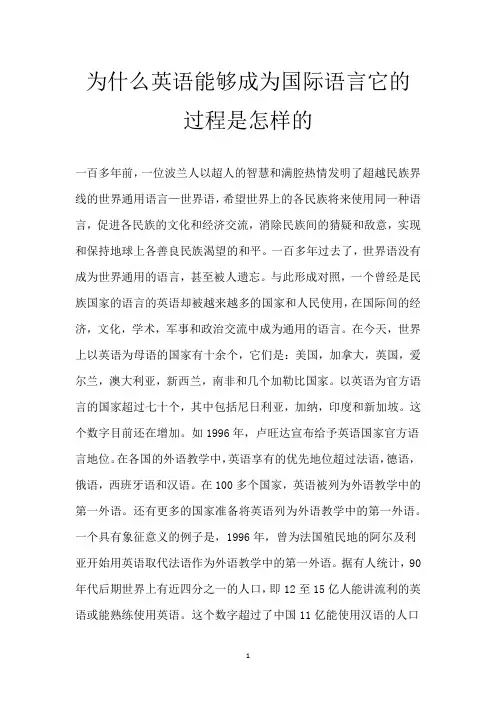
为什么英语能够成为国际语言它的过程是怎样的一百多年前,一位波兰人以超人的智慧和满腔热情发明了超越民族界线的世界通用语言—世界语,希望世界上的各民族将来使用同一种语言,促进各民族的文化和经济交流,消除民族间的猜疑和敌意,实现和保持地球上各善良民族渴望的和平。
一百多年过去了,世界语没有成为世界通用的语言,甚至被人遗忘。
与此形成对照,一个曾经是民族国家的语言的英语却被越来越多的国家和人民使用,在国际间的经济,文化,学术,军事和政治交流中成为通用的语言。
在今天,世界上以英语为母语的国家有十余个,它们是:美国,加拿大,英国,爱尔兰,澳大利亚,新西兰,南非和几个加勒比国家。
以英语为官方语言的国家超过七十个,其中包括尼日利亚,加纳,印度和新加坡。
这个数字目前还在增加。
如1996年,卢旺达宣布给予英语国家官方语言地位。
在各国的外语教学中,英语享有的优先地位超过法语,德语,俄语,西班牙语和汉语。
在100多个国家,英语被列为外语教学中的第一外语。
还有更多的国家准备将英语列为外语教学中的第一外语。
一个具有象征意义的例子是,1996年,曾为法国殖民地的阿尔及利亚开始用英语取代法语作为外语教学中的第一外语。
据有人统计,90年代后期世界上有近四分之一的人口,即12至15亿人能讲流利的英语或能熟练使用英语。
这个数字超过了中国11亿能使用汉语的人口数字。
现在,在世界五大洲均有讲英语的国家和人民。
在国际交往中,英语的地位更是其他国家的语言望尘末及的。
英语正在成为或已经成为世界通用的语言。
一、历史上的英国殖民×义与语言扩张从历史根源上说,世界上出现若干个以英语为母语的国家与早期英国殖民主义的扩张有关。
当时(16世纪)英国人向海外殖民,建立若干殖民地。
随着殖民地经济社会的发展,殖民地的人民开始形成本土意识,最后宣布独立或建立自治政府,成为独立或半独立的国家。
于是,英语成为若干国家的官方语言以及那些国家的人民的母语。
英语开始带有某种国际语言的色彩。
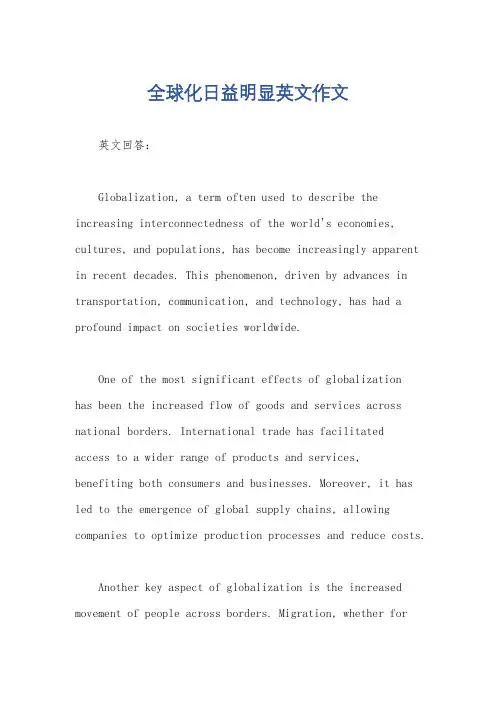
全球化日益明显英文作文英文回答:Globalization, a term often used to describe the increasing interconnectedness of the world's economies, cultures, and populations, has become increasingly apparent in recent decades. This phenomenon, driven by advances in transportation, communication, and technology, has had a profound impact on societies worldwide.One of the most significant effects of globalizationhas been the increased flow of goods and services across national borders. International trade has facilitatedaccess to a wider range of products and services,benefiting both consumers and businesses. Moreover, it has led to the emergence of global supply chains, allowing companies to optimize production processes and reduce costs.Another key aspect of globalization is the increased movement of people across borders. Migration, whether foreconomic opportunities, education, or political asylum, has played a pivotal role in shaping the demographic andcultural landscapes of many countries. While some migrants face challenges integrating into new societies, many others have made significant contributions to their adopted homelands.Globalization has also led to greater cultural exchange. The spread of ideas, values, and practices across borders has influenced the way people think, live, and interactwith one another. This has contributed to a growing awareness of different cultures and perspectives, leadingto both appreciation and misunderstanding.Despite its potential benefits, globalization has also faced criticism. Concerns about the loss of local jobs, the erosion of cultural identities, and the increasedinequality between nations have prompted some to question the desirability of unfettered globalization. However, the interconnectedness of the world's economies and the interdependent nature of global challenges make itessential to find ways to manage globalization's effectswhile harnessing its potential for progress.中文回答:随着近几十年来交通、通信和技术的发展,全球化逐渐成为显而易见的事实,这一现象对世界各地的社会产生了深远的影响。
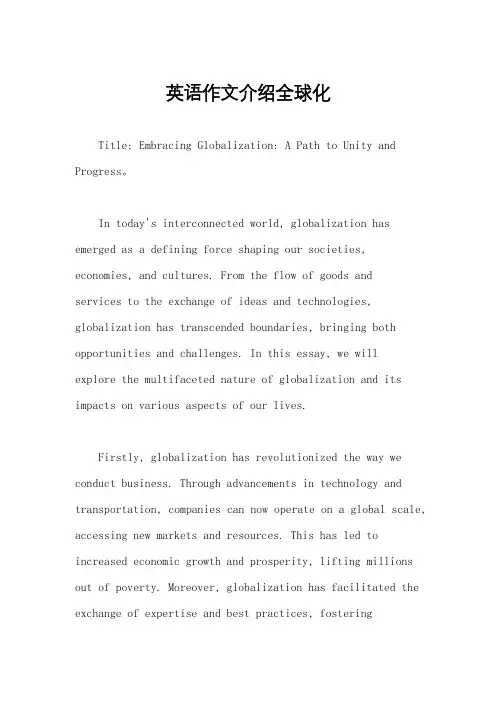
英语作文介绍全球化Title: Embracing Globalization: A Path to Unity and Progress。
In today's interconnected world, globalization has emerged as a defining force shaping our societies, economies, and cultures. From the flow of goods andservices to the exchange of ideas and technologies, globalization has transcended boundaries, bringing both opportunities and challenges. In this essay, we willexplore the multifaceted nature of globalization and its impacts on various aspects of our lives.Firstly, globalization has revolutionized the way we conduct business. Through advancements in technology and transportation, companies can now operate on a global scale, accessing new markets and resources. This has led to increased economic growth and prosperity, lifting millions out of poverty. Moreover, globalization has facilitated the exchange of expertise and best practices, fosteringinnovation and competitiveness.On the social front, globalization has fosteredcultural exchange and understanding among nations. People can now connect instantaneously across continents, sharing traditions, beliefs, and experiences. This culturaldiversity enriches our societies, promoting tolerance and acceptance. Additionally, globalization has facilitated greater mobility, allowing individuals to explore new opportunities and experiences beyond their borders.However, globalization also presents challenges that must be addressed. One of the primary concerns is the widening gap between the rich and the poor. While globalization has created wealth for many, it has also exacerbated inequalities, both within and between countries. Addressing this disparity requires concerted efforts to ensure inclusive growth and equitable distribution of resources.Furthermore, globalization has raised environmental concerns, as increased trade and consumption contribute topollution and resource depletion. Sustainable practices and international cooperation are essential to mitigate these effects and safeguard our planet for future generations.In the realm of politics, globalization has reshaped the dynamics of international relations. Nations are now more interconnected than ever, facing shared challenges such as climate change, terrorism, and pandemics. Cooperation and diplomacy are vital in addressing these global issues, transcending national interests for the greater good of humanity.In conclusion, globalization is a complex and multifaceted phenomenon that has transformed our world in profound ways. While it offers immense opportunities for progress and development, it also poses challenges that require collective action and cooperation. By embracing the principles of inclusivity, sustainability, and solidarity, we can harness the benefits of globalization while mitigating its adverse effects, paving the way for a more prosperous and harmonious global community.。
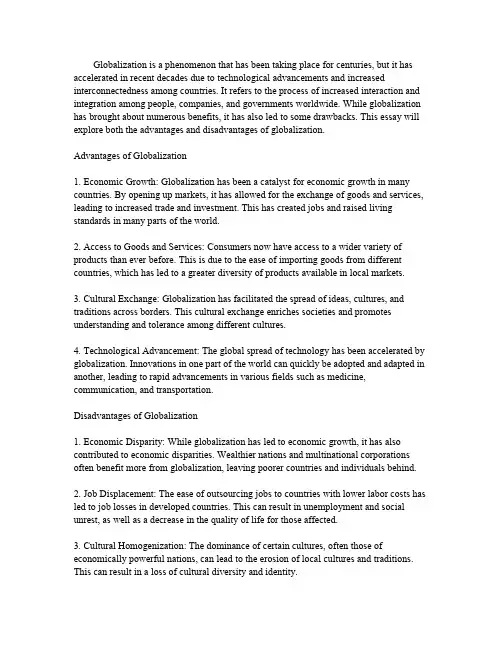
Globalization is a phenomenon that has been taking place for centuries,but it has accelerated in recent decades due to technological advancements and increased interconnectedness among countries.It refers to the process of increased interaction and integration among people,companies,and governments worldwide.While globalization has brought about numerous benefits,it has also led to some drawbacks.This essay will explore both the advantages and disadvantages of globalization.Advantages of Globalization1.Economic Growth:Globalization has been a catalyst for economic growth in many countries.By opening up markets,it has allowed for the exchange of goods and services, leading to increased trade and investment.This has created jobs and raised living standards in many parts of the world.2.Access to Goods and Services:Consumers now have access to a wider variety of products than ever before.This is due to the ease of importing goods from different countries,which has led to a greater diversity of products available in local markets.3.Cultural Exchange:Globalization has facilitated the spread of ideas,cultures,and traditions across borders.This cultural exchange enriches societies and promotes understanding and tolerance among different cultures.4.Technological Advancement:The global spread of technology has been accelerated by globalization.Innovations in one part of the world can quickly be adopted and adapted in another,leading to rapid advancements in various fields such as medicine, communication,and transportation.Disadvantages of Globalization1.Economic Disparity:While globalization has led to economic growth,it has also contributed to economic disparities.Wealthier nations and multinational corporations often benefit more from globalization,leaving poorer countries and individuals behind.2.Job Displacement:The ease of outsourcing jobs to countries with lower labor costs has led to job losses in developed countries.This can result in unemployment and social unrest,as well as a decrease in the quality of life for those affected.3.Cultural Homogenization:The dominance of certain cultures,often those of economically powerful nations,can lead to the erosion of local cultures and traditions. This can result in a loss of cultural diversity and identity.4.Environmental Impact:The increased movement of goods and people across borders can lead to environmental degradation.The carbon footprint of transportation and the exploitation of natural resources for the production of goods are significant concerns.5.Loss of Sovereignty:Countries may experience a loss of control over their economic and political decisions due to the influence of multinational corporations and international trade agreements.This can lead to policies that favor the interests of these entities over the needs of the local population.ConclusionGlobalization is a complex process with farreaching implications.While it offers opportunities for economic growth,cultural exchange,and technological advancement,it also presents challenges such as economic disparity,job displacement,and environmental degradation.It is essential for policymakers and societies to carefully consider these factors and strive to mitigate the negative impacts of globalization while maximizing its benefits.This can be achieved through responsible trade practices,fair labor standards, and sustainable development initiatives that take into account the needs of both people and the planet.。
![[英语作文]Globalization全球化](https://uimg.taocdn.com/f61d4872bdd126fff705cc1755270722192e59b3.webp)
[英语作文]Globalization全球化Globalization refers to the increasing interconnectedness and interdependence of people, economies, and cultures around the world. It is a complex process that has been shaped by various factors, including technological advancements, trade liberalization, and the spread of ideas through communication and media. Globalization has had significant impacts on different aspects of our lives, ranging from economic growth and job opportunities to cultural exchange and environmental challenges.One of the most prominent effects of globalization is the expansion of international trade. The removal of trade barriers and the rise of multinational corporations have facilitated the flow of goods, services, and capital across borders. This has led to increased economic growth in many countries, as well as greater access to goods and services for consumers. However, globalization has also contributed to income inequality within and between countries, as some individuals and regions benefit more than others from these economic changes.Another significant aspect of globalization is the spread of ideas and information. Advances in communication technology have made it easier for people to connect with each other across great distances, allowing for the exchange of ideas, cultures, and beliefs. This has led to increased cultural diversity and awareness, as well as the emergence of global social movements and political debates. However, it has also raised concerns about cultural homogenization and the loss of local traditions and identities.Globalization has also had a profound impact on the environment. The increased demand for resources and energy, coupled with the growth of transportation and production networks, has contributed to environmental degradation and climate change. This has highlighted the need for global cooperation and policy coordination to address these challenges and promote sustainable development.Despite its benefits, globalization has faced criticism and opposition from those who argue that it prioritizes corporate interests over social and environmental concerns. Some critics contend that globalization exacerbates poverty and exploitation, particularly in developing countries, and undermines democratic decision-making. As a result, there have been calls for more equitable and inclusive forms of globalization that prioritize human rights, labor standards, and environmental protections.In conclusion, globalization is a complex and multifaceted phenomenon that has transformed the world in numerous ways. While it has brought significanteconomic and cultural benefits, it has also presented challenges related to inequality, cultural identity, and environmental sustainability. Navigating these challenges will require collective efforts and a commitment to finding solutions that balance economic growth with social and environmental justice.。
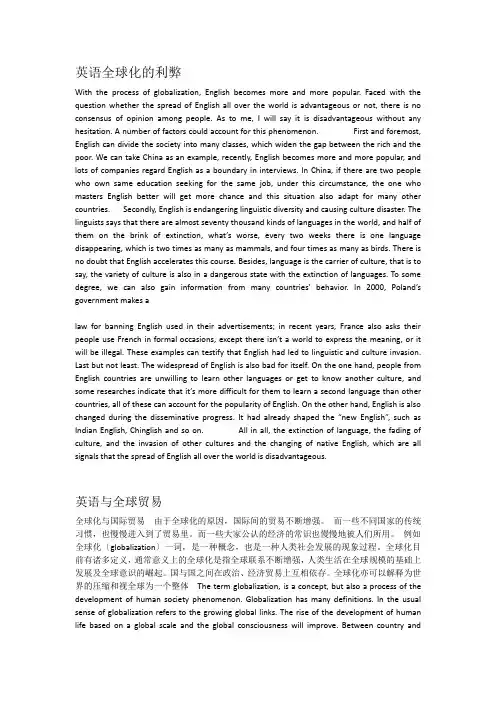
英语全球化的利弊With the process of globalization, English becomes more and more popular. Faced with the question whether the spread of English all over the world is advantageous or not, there is no consensus of opinion among people. As to me, I will say it is disadvantageous without any hesitation. A number of factors could account for this phenomenon. First and foremost, English can divide the society into many classes, which widen the gap between the rich and the poor. We can take China as an example, recently, English becomes more and more popular, and lots of companies regard English as a boundary in interviews. In China, if there are two people who own same education seeking for the same job, under this circumstance, the one who masters English better will get more chance and this situation also adapt for many other countries. Secondly, English is endangering linguistic diversity and causing culture disaster. The linguists says that there are almost seventy thousand kinds of languages in the world, and half of them on the brink of extinction, what’s worse, every two weeks there is one language disappearing, which is two times as many as mammals, and four times as many as birds. There is no doubt that English accelerates this course. Besides, language is the carrier of culture, that is to say, the variety of culture is also in a dangerous state with the extinction of languages. To some degree, we can also gain information from many countries’ behavior. In 2000, Poland’s government makes alaw for banning English used in their advertisements; in recent years, France also asks their people use French in formal occasions, except there isn’t a world to express the meaning, or it will be illegal. These examples can testify that English had led to linguistic and culture invasion. Last but not least. The widespread of English is also bad for itself. On the one hand, people from English countries are unwilling to learn other languages or get to know another culture, and some researches indicate that it’s more difficult for them to learn a second language than other countries, all of these can account for the popularity of English. On the other hand, English is also changed during the disseminative progress. It had already shaped the “new English”, such as Indian English, Chinglish and so on. All in all, the extinction of language, the fading of culture, and the invasion of other cultures and the changing of native English, which are all signals that the spread of English all over the world is disadvantageous.英语与全球贸易全球化与国际贸易由于全球化的原因,国际间的贸易不断增强。
英语成为国际语言的原因英语作文The reasons behind English becoming an international languageEnglish has become the dominant global language for many reasons. It is estimated that over 1.5 billion people worldwide speak English, making it the most widely spoken language in the world. As a result, English has become the primary language of international communication, business, diplomacy, and education. In this essay, we will explore the key reasons why English has achieved such widespread popularity as an international language.One of the main reasons why English has become the dominant global language is the historical influence of the British Empire. During the 19th and 20th centuries, the British Empire was the largest empire in history, covering a quarter of the world's land area and ruling over a quarter of the world's population. As a result, the English language was spread across the globe through colonization, trade, and migration. Many countries that were once part of the British Empire, such as India, Australia, Canada, and South Africa, continue to use English as an official or national language.In addition to the historical influence of the British Empire, the United States has also played a significant role in the global spread of English. As the world's largest economy and a major cultural and technological hub, the United States has a dominant influence on global media, entertainment, and technology. American popular culture, including movies, music, television, and the internet, is consumed by people all over the world, further popularizing the English language.Furthermore, English has become the language of international business and diplomacy. In today's globalized world, being able to communicate in English is essential for business professionals, diplomats, and international organizations. English is the primary language of commerce, finance, and trade, as well as the official language of many international organizations, such as the United Nations, NATO, and the World Bank. As a result, English has become the lingua franca of the business world, enabling people from different countries and cultures to communicate effectively and collaborate on a global scale.Moreover, English is the language of education and academia. Many of the world's top universities teach in English and publish their research in English-language journals. As aresult, proficiency in English is essential for students and researchers who wish to study and work in the fields of science, technology, medicine, and the humanities. English proficiency is also a key factor in gaining access to higher education and employment opportunities in many countries, asEnglish-language skills are often required for admission to universities and for job applications.Additionally, the internet has played a significant role in the global spread of English. The majority of websites, social media platforms, and online content are in English, making English the dominant language of the internet. As a result, people all over the world are exposed to English-language content on a daily basis, further reinforcing the importance of English as a global language.In conclusion, the widespread popularity of English as an international language can be attributed to a combination of historical, cultural, economic, and technological factors. The historical influence of the British Empire, the dominant role of the United States in global affairs, the importance of English in business and diplomacy, the prevalence of English in education and academia, and the influence of the internet have all contributed to making English the lingua franca of the modernworld. As a result, English is likely to continue to serve as the primary language of international communication and collaboration for the foreseeable future.。
英语语言变化中的社会因素语言,作为人类交流和表达思想的工具,并非是一成不变的。
英语,这一在全球范围内广泛使用的语言,其发展历程中充满了变化。
而这些变化,在很大程度上受到了社会因素的影响。
社会的变迁是推动英语语言变化的重要力量。
工业革命带来了巨大的社会变革,新的技术、新的生产方式和新的职业不断涌现。
例如,“steam engine”(蒸汽机)、“factory”(工厂)、“mechanic”(机械师)等词汇应运而生。
随着科技的飞速发展,现代社会中的计算机、互联网相关词汇如“software”(软件)、“hardware”(硬件)、“website”(网站)等逐渐成为了英语中的常用词汇。
社会的进步促使人们需要新的词汇来描述新的事物和现象,从而推动了英语词汇的不断丰富和更新。
经济因素在英语语言的变化中也发挥着关键作用。
国际贸易的发展使得英语成为了商务交流的重要语言。
为了适应全球经济交流的需求,商务英语逐渐形成了一套独特的词汇和表达方法。
例如,“import”(进口)、“export”(出口)、“stock market”(股票市场)等词汇在商务领域中被广泛使用。
经济的繁荣或衰退也会影响语言的使用。
在经济繁荣时期,可能会出现更多积极、乐观的词汇和表达方式;而在经济衰退时期,语言中可能会更多地体现出担忧、焦虑等情绪。
文化的交流与融合对英语语言的变化产生了深远影响。
全球化的进程使得不同国家和民族的文化相互碰撞和融合。
英语吸收了来自世界各地语言的词汇和表达方式。
比如,来自法语的“rendezvous”(约会)、来自日语的“karaoke”(卡拉 OK)、来自中文的“kung fu”(功夫)等。
这种文化的融合不仅丰富了英语的词汇,也使得英语的表达方式更加多样化。
政治因素同样在英语语言的变化中留下了深刻的印记。
战争、政治变革等重大政治事件往往会带来新的词汇和表达方式。
例如,两次世界大战期间,出现了“blitzkrieg”(闪电战)、“atomic bomb”(原子弹)等与战争相关的词汇。
英语全球化与语种的消失作者:房娟来源:《成才之路》 2012年第18期安徽怀远●房娟摘要:近些年来,伴随着全球化的进程,英语已成了当今世界的主导性语言,并在全球范围传播和普及。
英语的全球化给世界其他语种尤其是小国语种带来了极大的破坏。
有语言学家曾经预言到本世纪末,全球有不少的语言将从此消失。
语言和一个国家的文化和历史息息相关,语言的消失代表着一段历史的完结,是全世界共同的损失。
因此,要及时采取措施对策,在学习英语的同时也要注意保护弱势小语种。
关键词:英语全球化;语种;消失一、英语传播的原因和影响曾经英国的一家媒体这样评论:战舰能让别国人民暂时臣服,而让他们理解你的语言却能让大家成为朋友。
我们知道,英语的广泛传播直到今天成为国际语言,是有其历史原因的。
从16世纪至20世纪初,英国开始对外进行疯狂的殖民扩张,在其无敌舰队和东印度公司和皇室的支持下,其殖民地曾遍布全球。
从拉丁美洲、欧洲到亚洲,无不留下它征服的痕迹。
这也是英国被称为“日不落帝国”的原因。
而在其统治期间,也把其语言和文化带去这些国家并成为其官方语言。
全世界对英语的疯狂后果是可怕的,它的结果是文化和思想意识的流失,我国也存在这种现象。
近年来,全国上下都在为学习英语而疯狂,而本民族的文化却越来越被人们所忽视,这种现状不仅会使我们的母语慢慢变成弱势语种,也对本民族的传统文化的传承产生影响,甚至会影响到我国在国际上的地位。
同时,在英语上花费过多的时间和精力也分散和打击了青少年对科学和真理的追求。
二、为何要保护濒危语种语言是交际的工具,越使用越能促进它的发展和变化。
而一些小语种之所以会消失,也有他们本国自己的原因。
小语种之所以“小”,是因为使用的人少,造成无法走向国际舞台,难以和外界交流发展,导致本国实力止步不前甚至落后。
这时,就有一部分人将这种落后完全归结到他们所使用的语言上,觉得他们的落后是因为文化的落后和语言的落后引起的,由此就对自己的母语产生了一些抵触情绪,结果造成越来越不愿意使用自己的母语,从而导致母语使用的功能更加减弱。
小学英语教育的现状与全球化背景下的思考随着全球化进程的不断加速,英语作为一门国际通用语言,其在小学教育中的地位日益重要。
小学英语教育的现状与全球化背景下的思考,成为了教育界和家长们共同关注的话题。
本文将从小学英语教育的现状、全球化背景下的挑战以及应对策略三个方面进行探讨。
一、小学英语教育的现状小学英语教育的现状呈现出以下几个方面的特点。
首先,小学英语教育的普及程度不断提高。
随着全球化的发展,人们对英语的需求越来越大,小学英语教育也逐渐从城市扩展到农村地区。
越来越多的学校将英语列为必修科目,使得更多的孩子有机会接触和学习英语。
其次,小学英语教育的教学方法日趋多样化。
过去,小学英语教育以传统的语法翻译法为主,注重课文的背诵和语法规则的记忆。
而现在,随着教育理念的更新和技术的发展,越来越多的教师开始采用互动式、任务型和情境化的教学方法,注重培养学生的实际语言运用能力。
再次,小学英语教育的教材和资源日益丰富。
目前市场上有各种各样的英语教材和学习资源,从传统的纸质教材到在线学习平台,供教师和学生选择。
这为小学英语教育提供了更多的选择和可能性,也方便了教学的开展。
二、全球化背景下的挑战在全球化背景下,小学英语教育面临着一些挑战。
首先,教师素质不均衡。
由于小学英语教育的普及,需要大量的英语教师。
然而,由于各地区的经济和教育资源的差异,导致了教师素质的不均衡。
一些地区的教师缺乏英语专业知识和教学经验,难以胜任教学任务。
其次,评价体系不完善。
小学英语教育的评价体系主要以考试成绩为导向,忽视了学生的综合语言能力的培养。
这种评价方式容易导致教师和学生过分追求分数,而忽视了对英语实际运用能力的培养。
再次,教学资源不平衡。
在全球化的背景下,一些地区的学校和学生可以更容易地接触到国际化的教学资源,而另一些地区的学校和学生则面临着资源匮乏的问题。
这种资源的不平衡会导致教学质量的差异。
三、应对策略为了应对全球化背景下小学英语教育的挑战,我们可以从以下几个方面进行思考和努力。
英语成为国际语言的原因英语作文英文回答:English has become the international language for several reasons. Firstly, it can be traced back to the historical influence of the British Empire. During the colonial era, the British Empire had a significant impact on various parts of the world, including North America, Australia, India, and many African countries. As a result, English was introduced and spread to these regions, becoming the dominant language.Secondly, the rise of the United States as a global superpower after World War II further solidified the position of English as an international language. The United States has been a major player in global politics, economy, and culture, and the English language hasnaturally followed suit.Another reason for the widespread use of English is itspracticality and accessibility. English is relatively easy to learn compared to other languages, and it has a simple grammar structure. Moreover, English is widely used in various fields such as business, science, technology, and tourism. Many international organizations, conferences, and academic publications are conducted in English, making it essential for individuals to have a good command of the language in order to participate and succeed in these domains.Furthermore, the influence of popular culture, particularly American movies, music, and television shows, has contributed to the global popularity of English. The entertainment industry has a significant impact on people's lives, and the English language is often associated with the glamour and success portrayed in these media. This has led to a desire for many individuals around the world to learn English in order to be part of this global cultural phenomenon.In conclusion, the historical influence of the British Empire, the rise of the United States as a globalsuperpower, the practicality and accessibility of English, and the influence of popular culture have all contributedto the status of English as the international language.中文回答:英语成为国际语言有几个原因。
全球化英文演讲稿篇一:全球化英文演讲稿This is opposites becomes globalization,we know that some place’s economics get great,however some poorest than they ever we promote globalization or not Is globalization the arch-criminal to the poverty gap What is globalization That is ,diffuse market economy from one country to all of the world,make capitalism cover every corner of the globe. And we all know, if one country carry out the Capitalism and market economy in the same time ,it can get great efficiency ,increase the productivity. But everybody knows market economy have its own shortcomings ,first,it can lead to poverty gap easily. The rich richer, the poor poorer. This is the nature of the market economy.But, because of this, we should stop globalization If there is no globalization, how the Multi-National Corporation make Listing and financing, put their product to every place in the world to every people’s there is no globalization,many problem couldn’t besolved by peace ways. Like country in Africa get independent.;the chemical weapon in Syria. If there is no globalization ,people with different color skin couldn’t understand each other .our Chinese civilization could not get famous.Just like an old going says,one coins has two sides. Globalization is an inevitable trend, and do good to humas’s Fusion and development. We shouldn’t we should do some things to solve the poverty gap . We can make different tax rate to different people according to income; The richer the more. Open more market, reduce the cost of living;Strengthen the social welfare.Just like Politician Marchinde says: society becomes greater after it gets damaged.篇二:文化全球化英语演讲稿Cultural globalization, which is a direct consequence of economic globalization, rids China of its closed cultural system and leads it into a multicultural society. Chinese culture is the main body of the Confucian culture as a kind of ethnic culture. However, with information and economic integration,cultural exchange warms up quickly. Meanwhile, all kinds of foreign cultures are flocking into China. Standing on the street, you can see McDonald’s and KFC everywhere. Even their passenger volumes are larger than those breakfast stores in China. Most people admit that they would rather eat KFC and don’t want to eat China classic breakfast. Maybe because it’s something new. In the same way, Japanese anime, American movies and South Korean dramas spread to Chinese university campuses, causing a sensation. Chinese students are crazy about those fresh cultures. Some even are proud of knowing better than others. As a result, domestic animation and the Chinese classic get into risks.In this multicultural society, masses of rich and colorful ethnic cultures get together in a melting pot. These foreign cultures shock Chinese culture constantly at their different ideas and customs. In the case, how to deal with the impact of globalization and how to protect and develop Chinese traditional culture, these are hot topics which cause the high attention of policy and public opinion. Should we promote cultural integration or insist of cultural diversityIn a period that the world is increasingly becoming one, it’s advisable for us to take an open attitude to foreign cultures. Only after we do in this way, can we catch a necessary condition for local culture of its survival and development.As we all know, Chinese traditional culture is the spiritual and material wealth the Chinese nation ancestors created. Passing down from generation to generation, it is a distinct national characteristic of the long history of the culture. We must take in mind that our culture is the Chinese nation several thousand years civilization of crystallization. It is our superior culture, which is the other national culture can not replace. According to this, there is no possibility that we agree with cultural integration. Once ethnic cultures come into integration, our national culture will lose its unique characteristics and the ethnic superiority will also disappear. What’s more, the cultural integration makes the world culture big garden become single and boring. Therefore, Chinese culture way for the future development is bound to emphasize and inherit the national cultural essence.But this does not mean that other ethnic cultures mean nothing to us. We should make it clear that foreign cultures have essence and dregs. We should treat them quite sensibly and not extremely. To take the essence and discard the dregs, we will absorb the mankind advanced civilization achievements from foreign cultures.All in all, opinionly, I have the idea that Chinese authorities should encourage cultural diversity. By introducing other excellent ethnic cultures, our traditional culture can be riched and developed well.篇三:21世纪英语演讲稿目录第三届“21世纪杯”全国英语演讲比赛冠军——梁励敏 (2)第三届“21世纪杯”全国英语演讲比赛亚军——芮成钢 (5)第四届“21世纪杯”全国英语演讲比赛冠军——蔡力 ................................................ ... 9第六届“21世纪杯”全国英语演讲比赛冠军——戚悦 ................................................ ..11 第七届“21世纪杯”全国英语演讲比赛冠军——孙宁 .................................................13 第八届“21世纪杯”全国英语演讲比赛冠军——顾秋蓓..............................................17 第九届“21世纪杯”全国英语演讲比赛冠军——洪晔 .................................................20 第十届“21世纪杯”全国英语演讲比赛冠军——夏鹏 .................................................22第一章寻访记忆引子美丽的女主播,刘欣思维的游戏梁励敏演讲就要言之有物芮成钢is there a short cut?孙宁be yourself 顾秋蓓无一不可入演讲洪晔平谈中透着哀伤夏鹏第二章昨日重现(原声)第一届央视《环球了望》选段刘欣第二届穿洋越海梁励敏第三届东西方相聚芮成钢第四届我们和黄河一道成长蔡力第六届新北京,三色新奥运戚悦第七届全球化:中国年轻一代所面临的挑战与机遇孙宁第八届难忘的一幕顾秋蓓第九届机会之门就在前方洪晔第十届城墙与桥梁夏鹏第三章明灯导航“21世纪杯”英语演讲的艺术史蒂芬·卢卡斯第三只眼看演讲吴杏莲附录“21世纪杯”全国英语演讲比赛和流程简介历届比赛一览第三届“21世纪杯”全国英语演讲比赛冠军——梁励敏梁励敏北京外国语大学梁励敏,生于浙江杭州,毕业于北京外国语大学,获英语语言文学硕士学位,研究生期间专攻方向为美国社会研究。
浅谈英语全球化原因
作者简介:刘文君,现就读于中南大学外国语学院英语1004班。
(中南大学外国语学院 湖南 长沙 10083)
中图分类号:h0-9 文献标识码:a 文章编号:1006-026x(2012)
12-0000-01
如今,英语以成为世界上最主要的语言之一,甚至有统治语言
世界的趋势。有人会毫不犹豫的说英语已经成为一种全球性的语
言,也许他们是对的。每当我们走进一个大城市旅馆或者是饭店,
首先映入眼帘的便是双语标识。那我们就不禁想问,什么是全球性
语言?为什么是英语,而不是其他语言?这便是本文要探寻的问
题。
当一种语言被世界上所有国家所认可,并且扮演着特殊角色的
时候,我们就把这种语言命名为全球性语言。为了取得这个称号,
这种语言需要被全世界的人所使用。英语现在已经被100多个国家
作为第一外语而规定到教学环节中,例如中国、俄罗斯、德国、西
班牙、埃及、巴西。那么这就意味着英语是全球性语言了吗?从某
种程度上来讲,这基本正确。
一种语言成为全球性语言和使用它的人数的关系并不是很大,
却和哪些人使用它有很大的关系。在罗马帝国,拉丁语成为全球性
语言。这并不是因为罗马统治着很多的人,而是因为罗马帝国的强
大。之后,随着罗马帝国军事实力的没落,拉丁语继续在教育中扮
演着全球性语言近一千年。
英国工业革命之后,英国成为世界上最发达的国家,英国的经
济也迅猛增长。为了满足工业发展的需求,英国开始了她的殖民统
治。从此,英国踏上了历史的舞台。在19世纪,英国统治了澳大
利亚、新西兰、加拿大以及印度。同时,英国还占领了缅甸、斯里
兰卡、新加坡、马来西亚、沙捞越、文莱、香港以及亚洲的几个小
国家。在非洲大陆,英国在1875年掌控了苏伊士运河,在1882年
征服了埃及。20世纪初,英国又占领了黄金海岸、尼日尔、苏丹、
肯尼亚、乌干达、北罗德西亚以及上尼日利亚。同时,她还控制着
南非。
第一次世界大战前夕,英国是人类迄今为止最大的殖民帝国。
当时英国统治着3.35亿平方公里的国土面积以及39.35亿人口。
巨大的人口基数使得英国很容易的就将英语在她的国土上开花绽
放。甚至在一些殖民地,比如印度,人们甚至以说英语为荣,以此
来显示他的社会地位。
英国为英语的广泛传播做出了很大的贡献,大洋彼岸的美国也
为英语的全球化发挥了极大的作用。
美国是英国的又一个殖民地。许多美国人把英语作为他们的母
语。在英语被选为国家语言之后,英语在美国也得到了十足的发展。
第二次世界大战之后,美国在经济、军事、科技等方面取代了
往日英国的位置,这为英语在20世纪全球化进程中起到了关键性
的作用。如今,美国任在国际进出口贸易中占据重要位置。一方面,
美国是世界上高科技出口国之一。他们的产品说明全部用英语书
写,许多高科技国家为这些进口国公司提供培训,当让培训所使用
的语言也是英语。这样,就迫使许多非英语国家去学习英语,否则
他们就不能正确的操作这些进口回来的高科技机器。另一方面,随
着全球化的进程以及联合国、世界银行、世界货币组织、世界教科
文组织、世界卫生组织、国际原子能机构的建立,使得这些组织者
意识到来自不同国家的代表之间的交流成为了首先要解决的一个
问题。在这样的大环境下,就迫切的需要一种国际性的、能够共同
使用的语言。英语作为一种被世界上最强大的美国所使用的语言便
自然而然的成为了国际事务中的通用语言。即使是一些非英语国家
的组织也使用英语作为他们的官方语言,例如东南亚国家联盟。为
了减少语言障碍,这些国家便采用了一种中立的语言,这就是英语。
与此同时,文化产业的输出也扩大了英语的影响。一些电影巨
头,如新线、狮门、米高梅,把电影产业推向了一个新的高度。好
莱坞模式已经成功的复制到了世界各地。在19世纪20年代,英语
电影几乎占领了整个电影市场。从那时到现在,各种电影大奖的颁
奖仪式上基本上是用英语。在19世纪90年代,美国电影市场份额
占据整个世界电影市场份额的85%。欧洲古典音乐虽然很受欢迎,
但是起源于美国的流行音乐却有着更为广泛的影响。许多人通过英
语流行音乐来学习英语发音和简单的英语短句。美国发明了磁带录
音机更使得英语歌曲走遍世界。许多英语唱片专辑更是随处可见。
非英语国家的歌手想进入英语国家市场也不得不唱英语歌曲。英语
国家的年轻人甚至认为唱英语流行歌曲是流行潮流。根据1900年
企鹅流行音乐百科全书,557个音乐团队用英语唱歌。肥皂剧的诞
生促进了英语的普及。
另外一个使得英语成为世界性语言重要的原因便是英语语言本
身简单的结构。不像日语或者汉语,英语相对来说比较容易掌握。
英语只有26个字母,而前面所说的两种语言却有成千上万的字,
这可能也是其中的一个原因。作为拉丁语的一个进化版和罗马时期
最杰出的语言,让英语具备了容易教学和容易掌握的特性。中国的
拼音便是一个很好的证明。
由于各种各样的原因,英语已经统治了语言世界近200年的时
间。一种国际性语言的形成是有多方面因素造成的,例如政治、经
济、历史原因等等。汉语使用者得人数世界第一,但这并不意味着
汉语能成为世界性语言。把汉语推向世界舞台还需要很大的努力。
作为英语学习者,这份重任自然便落在了我们的肩上。虽然需要长
时间的努力,但是我们坚信这一天一定会到来!
参考文献:
[1] 谢福之 英语国家概况,外语教学与研究出版社,2007.
[2] david crystal,english as a global language
(second edition),cambridge university press,1997.